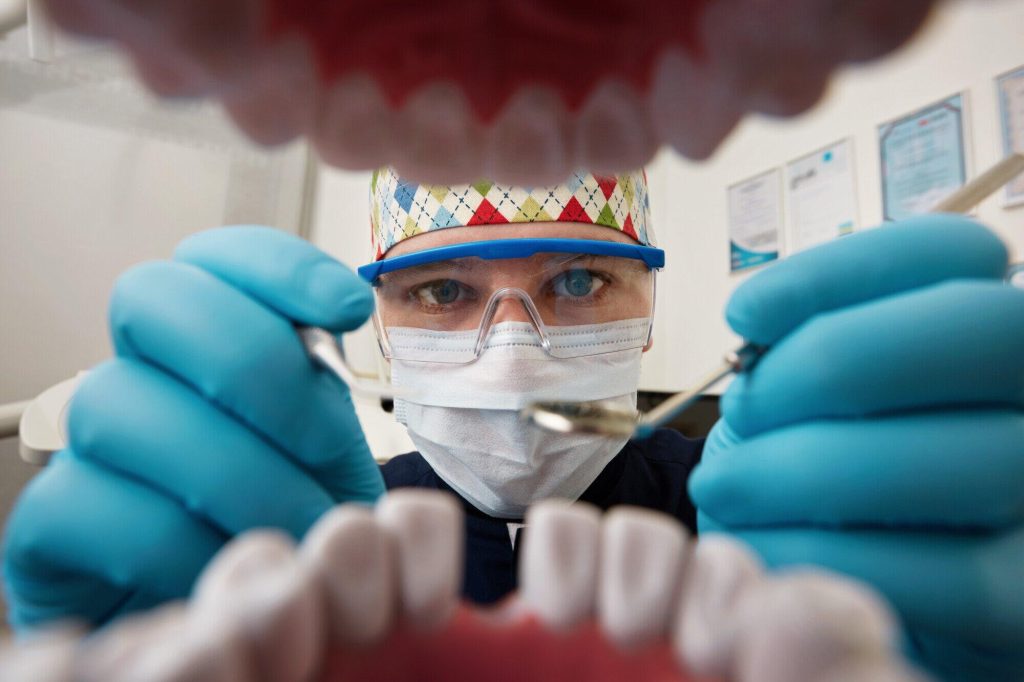Recovering from dental surgery can be uncomfortable, especially when it comes to managing pain during the first few days.
Whether you’ve had an extraction, implant, or gum procedure, knowing how to manage discomfort can make your recovery smoother and faster. With the right care plan and guidance from your dentist, you can minimize pain, prevent complications, and heal comfortably at home.
This guide walks you through everything you need to know about effective pain management after dental surgery – from medication and diet to long-term recovery habits that promote oral health.
Understanding Dental Surgery and Post-Operative Pain
Every dental surgery affects the tissues of your mouth differently, and understanding what happens during and after the procedure helps you prepare for recovery.
Pain is a natural part of the healing process, but with the right information, you can manage it effectively and avoid unnecessary discomfort. Knowing how long recovery takes and what symptoms to expect allows you to stay calm and confident through each stage.
What Happens During Dental Surgery
Dental surgery includes many procedures – from simple tooth extractions to complex jaw corrections. Each procedure involves manipulating soft tissue or bone, which naturally causes inflammation and tenderness.
The most common oral surgeries include root canals, dental implants, gum grafts, and extracting wisdom teeth. During the operation, you’ll receive local or general anesthesia to stay comfortable, but as it wears off, soreness and pressure begin to surface.
Why Pain Occurs After Dental Surgery
Post-surgery pain happens because your body is repairing tissue. The nerves and blood vessels around the surgical site become inflamed, which leads to swelling, stiffness, and mild throbbing sensations.
This discomfort is temporary and typically peaks within the first two days after surgery. The more carefully you follow your dentist’s instructions, the less intense the pain and swelling will feel.
How Long Does Post-Surgery Pain Last?
Most people experience the most pain within 24 to 48 hours after surgery, followed by gradual improvement over the next few days. By the end of the first week, soreness usually becomes minimal, though deeper tissues may still be healing.
Recovery time depends on your overall health, the complexity of the procedure, and your oral hygiene habits. Staying consistent with pain management methods ensures faster healing and fewer setbacks.
Preparing for Pain Management Before Surgery
Preparing before your dental surgery can make recovery much easier and more comfortable. Setting up your supplies, asking questions, and knowing what to expect will help you stay calm and organized once you return home. By planning, you reduce stress and focus your energy on healing instead of scrambling for essentials later.
Understanding What to Expect
Before the procedure, your dentist will explain what kind of discomfort to anticipate, how long recovery takes, and what medications will help. This information gives you confidence and helps you mentally prepare for the days ahead.
Knowing the type of anesthesia being used also helps you understand how you’ll feel afterward. The more informed you are, the smoother your overall experience will be.
Stocking Up on Essentials
Before surgery day, gather items that will make recovery easier – like soft foods, over-the-counter pain relievers, ice packs, and extra gauze. You might also want a neck pillow or a small blanket for rest.
Preparing your recovery area ahead of time helps you relax when you get home and prevents unnecessary movement that could aggravate the surgical site. Having everything ready allows you to focus entirely on comfort and healing.
Ask Questions About Pain Control Options
Every patient experiences pain differently, so your dentist can personalize your care plan. Ask whether you’ll need prescription medications or if over-the-counter options will be enough.
You can also ask about alternative methods like cold compresses, saltwater rinses, or medicated mouthwashes. Discussing these details ensures you’re fully equipped to handle discomfort safely and confidently.
Common Pain Management Methods
After surgery, controlling pain is essential for both comfort and healing. A combination of prescribed medication, rest, and simple home remedies often provides the best results. Understanding each option helps you find a balance that keeps pain manageable while minimizing side effects.
Prescription Medications
For moderate to severe pain, your dentist may prescribe pain relievers such as:
- ibuprofen
- acetaminophen
- mild opioids
These medications target inflammation and nerve pain to keep you comfortable during the early recovery period. Always follow your dentist’s dosage instructions to prevent overuse or side effects. If you notice nausea, dizziness, or allergic reactions, contact your dental office immediately for alternative options.
Over-the-Counter Pain Relievers
Milder surgeries often require only non-prescription medication. Ibuprofen reduces swelling and tenderness, while acetaminophen focuses on dulling pain.
Some patients alternate between the two to maintain consistent relief without heavy medication. Always consult your dentist before combining or adjusting any medicines to ensure safe and effective use.
Ice Therapy
Applying cold compresses helps reduce inflammation and numbs pain naturally. Use an ice pack wrapped in a thin towel and apply it to your cheek for 15 to 20 minutes at a time.
Take short breaks between applications to prevent skin irritation. During the first 24 hours, this technique can dramatically lower swelling and keep you more comfortable.
Rest and Hydration
Resting allows your body to focus on healing instead of other physical tasks. Avoid heavy lifting, exercise, or bending for at least a full day after your procedure.
Drink plenty of water, but avoid straws – suction can dislodge the blood clot protecting your surgical site. Staying hydrated helps your body flush out medication residues and supports faster tissue repair.
Natural Remedies and Home Care for Pain Relief
Home remedies are often helpful for easing mild discomfort and promoting healing naturally. When used properly, they can complement medication and speed up recovery. Always confirm with your dentist before trying new treatments to make sure they won’t interfere with prescribed care.
Saltwater Rinses
Warm saltwater rinses help clean the surgical area and reduce bacteria buildup. Mix a teaspoon of salt in a glass of warm water and swish gently after the first 24 hours. Avoid vigorous rinsing, as it can disturb stitches or loosen clots. Regular gentle rinsing keeps your mouth fresh and supports faster healing.
Herbal and Natural Soothers
Natural remedies such as clove oil or chamomile can help reduce pain and inflammation. Clove oil contains eugenol, a compound with natural numbing effects.
You can apply a small, diluted amount using a cotton swab near the affected area. Chamomile tea bags, when cooled and applied as compresses, may also calm irritation and promote relaxation.
Maintain Good Oral Hygiene
Even after surgery, oral hygiene remains essential for preventing infection. Brush gently around the surgical site while keeping the area clean and free of debris.
Use a soft-bristled toothbrush and avoid harsh rinsing or flossing near stitches for the first few days. A clean mouth encourages faster healing and reduces the risk of complications.
Managing Swelling and Inflammation
Swelling is a normal part of the healing process, but it can make your mouth feel tight or sore. Managing inflammation correctly can greatly improve your comfort and help tissues recover faster. With simple adjustments and consistent care, you can control swelling within the first few days.
The First 24 Hours
Swelling usually peaks within the first day after surgery. Applying ice packs at regular intervals helps limit inflammation and numb pain. Keep your head elevated while resting to reduce blood flow to the affected area. Avoid touching or pressing on your cheeks, as this can worsen irritation.
After 48 Hours
Once two days have passed, switch from cold compresses to warm ones. Gentle heat improves circulation, allowing the body to carry away excess fluids and reduce stiffness.
Apply a warm towel or heating pad on low setting for 10 minutes at a time. This shift in temperature therapy encourages healing and improves flexibility in the jaw.
Keeping Your Head Elevated
Sleeping or resting with your head raised on two pillows helps minimize swelling. The elevation prevents blood from pooling near the surgical site.
This simple adjustment can significantly reduce throbbing pain overnight. Maintaining this position for several days leads to a faster reduction in inflammation and discomfort.
Diet and Nutrition for a Faster Recovery
What you eat after dental surgery directly affects your healing speed and comfort level. Soft, nutritious foods reduce irritation and keep your body strong while it repairs tissue. Avoid anything crunchy or spicy that could reopen the wound or disturb stitches.
Start With Soft Foods
Immediately after surgery, stick to soft foods like mashed potatoes, yogurt, smoothies, and soups. These options provide nutrients without requiring much chewing.
Avoid hot foods, as heat can increase bleeding or swelling. As you heal, gradually introduce firmer foods as your comfort level improves.
Stay Nourished
Proper nutrition supports the immune system and helps your mouth heal more quickly. Choose foods rich in vitamins A, C, and protein for tissue repair and energy.
Even if you don’t feel hungry, try to eat small portions throughout the day. Staying nourished ensures your body has the strength to fight inflammation and rebuild tissue.
Gradually Reintroduce Solid Foods
After several days, when the pain decreases, you can start adding soft solids like scrambled eggs or pasta. Avoid crunchy snacks until the surgical site is completely healed.
Chew carefully and on the opposite side of your mouth to prevent irritation. Listening to your body’s cues helps prevent pain and supports steady healing.
Avoiding Common Post-Surgery Complications
Knowing what to avoid after dental surgery prevents unnecessary pain and helps you recover faster. Complications like dry socket or infection can be painful and delay healing, but they’re mostly preventable with careful care and good hygiene.
Dry Socket
A dry socket occurs when the protective blood clot dislodges too soon, exposing bone and nerves. This condition can cause sharp, throbbing pain that radiates to the ear or jaw.
Avoid using straws, spitting forcefully, or smoking during the first week to keep the clot in place. If pain suddenly worsens after initial improvement, contact your dentist right away.
Infection
Infection signs include persistent swelling, redness, or a bad taste in your mouth. Following proper hygiene and taking prescribed antibiotics greatly reduces this risk. Always complete your antibiotic course even if symptoms fade early. Early treatment prevents complications and ensures healthy healing.
Nerve Sensitivity
You may feel temporary tingling or numbness if nerves were affected during surgery. This usually improves as swelling decreases and tissues repair themselves. Avoid touching or pressing the area while it heals. If numbness lasts longer than a few weeks, schedule a follow-up with your dentist.
Emotional and Mental Aspects of Recovery
Pain isn’t only physical – it also affects your mood and energy. Understanding and managing emotional stress during recovery is just as important as treating physical symptoms. Staying positive and patient helps you heal faster and feel more in control.
Anxiety About Pain
It’s normal to worry about discomfort after surgery, especially if you’ve had difficult experiences in the past. Remind yourself that pain is temporary and part of the healing process.
Practicing deep breathing and short relaxation exercises can calm your nerves. Listening to soft music or guided meditations also helps ease anxiety and promote rest.
Rest and Patience
Rest is the foundation of recovery. Your body repairs tissues most effectively when you’re sleeping or relaxing. Avoid rushing back to your usual routine or eating hard foods too soon. Giving yourself time to heal properly prevents setbacks and promotes lasting comfort.
Support From Loved Ones
Having someone nearby after surgery can make recovery easier. They can help prepare food, remind you to take medicine, or simply offer company during the first few days.
Support reduces emotional stress and helps you stay focused on healing. Accepting help when offered can make a big difference in your comfort and peace of mind.
Healing Comfortably and Confidently
Recovering from dental surgery requires patience, rest, and consistent care. When you understand what to expect and follow your dentist’s advice, pain becomes much easier to manage. From cold compresses to medication and proper nutrition, every small step contributes to a faster, smoother recovery.
Take the first step toward a pain-free recovery – consult your dentist, prepare your care plan, and give your smile the attention it deserves.
Got questions? We’ve got answers! Check out our blog for loads of interesting and helpful content today!







